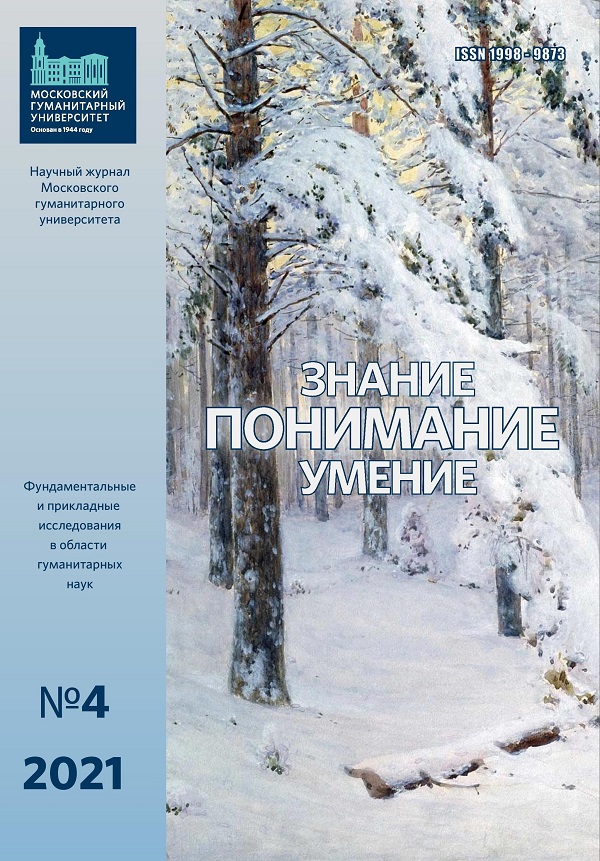Главная / Main Page / "Knowledge. Understanding. Skill" Journal / Contents / 2014 / No. 4
Sychev A. A. Moral Dimensions of Ecological Footprint
This article was written within the framework of the research project “Ethics of Environmental Responsibility: Theoretical and Applied Aspects” (RF Presidential grant MD-3512.2013.6).
(Ogarev Mordovia State University)
Abstract ♦ The article argues in favor of the concept of ecological footprint as a possible and necessary indicator of sustainability. In the environmental sphere the connection between acts and their consequences is often complex and indirect. People do not fully realize what kind of impact their daily activities will have upon nature or future generations, and therefore they do not feel any moral responsibility in this respect. Ecological knowledge can change this situation, but it is difficult for a layman to grasp specialized scientific information. The author of the article, following the ideas of M. Wackernagel and W. Rees, who coined the concept of “ecological footprint” back in 1996, suggests that it should be used in order to solve the problems of environmental ethics.
Ecological footprint can be regarded as an instrument which can convert professional environmental data into a form accessible to everyone. It allows a person to make an informed choice about the moral acts detrimental to the natural environment.
The use of the ecological footprint promotes environmental awareness and understanding of real connections in socio-natural system. It allows us to “visualize” sustainability, transferring it from the category of purely theoretical concepts and firmly root it in real life as a set of specific characteristics and actions. The simplicity of calculations allows using ecological footprint for the educational and training purposes.
Applying the ecological footprint as an indicator of sustainability helps us rethink individual habits and value systems of human development and to assess the results of economic activity not only from the standpoint of material benefits, but also from an environmental perspective. Using the information on how various activities affect the size of the ecological footprint, it is possible to plan activities to protect the environment and to coordinate the efforts of individuals, organizations and states to conserve and restore the resource base of the planet.
Keywords: environmental ethics, morality, ecological footprint, biocapacity, ecological debt, sustainability, responsibility.
Sychev Andrey Anatolievich, Doctor of Philosophy, Professor, Department of Philosophy, N. P. Ogarev Mordovia State University. Postal address: 68 Bolshevistskaya St., Saransk, Russian Federation, 430005. Tel.: +7 (8342) 29-05-89. E-mail:
sychevaa@mail.ru

Citation: Sychev A. A. (2014) Moral'nye izmereniia ekologicheskogo sleda [Moral Dimensions of Ecological Footprint ]. Znanie. Ponimanie. Umenie, no. 4, pp. 48–55. (In Russ.).
Submission date: 11.03.2014.
RUSSIAN VERSION
REFERENCES
Aristotle. (1983) Sochineniia [Works] : in 4 vols. Moscow, Mysl’ Publ. Vol. 4. 830 p. (In Russ.).
Beck, U. (2000) Obshchestvo riska. Na puti k drugomu modernu [Risk Society. Towards a New Modernity]. Moscow, Progress-Traditsiia Publ. 384 p. (In Russ.).
Borucke, M., Moore, D., Cranston, G., Gracey, K., Iha, K., Larson, J., Lazarus, E., Morales, J. C., Wackernagel, M. and Galli, A. (2013) Accounting for Demand and Supply of the Biosphere's Regenerative Capacity: The National Footprint Accounts’ Underlying Methodology and Framework. Ecological Indicators, vol. 24, pp. 518–533.
Ewing, B., Moore, D., Goldfinger, S., Oursler, A., Reed, A. and Wackernagel, M. (2010) The Ecological Footprint Atlas 2010. Oakland, CA, Global Footprint Network. 111 р.
Wackernagel, M. and Rees, W. (1996) Our Ecological Footprint: Reducing Human Impact on the Earth. Gabriola Island, BC ; Philadelphia, PA : New Society Publishers. xi, 160 p.
|
|
 Вышел в свет
Вышел в свет
№4 журнала за 2021 г.
|
|
|
|